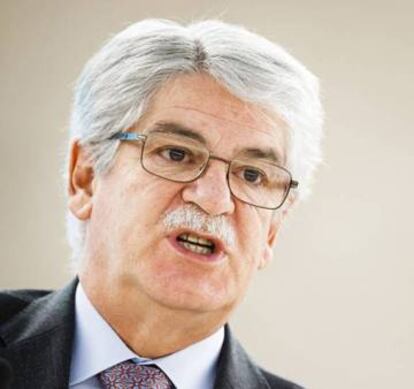Puigdemont’s release from custody risks rift between Spain and Germany
Spanish authorities question use of EU warrants after German justice system dismisses rebellion charges against former Catalan premier

The decision by a German judge to release former Catalan leader Carles Puigdemont from custody, after he was held for 12 days on a European arrest warrant, has created tension between the governments of Chancellor Angela Merkel and Spain’s Prime Minister Mariano Rajoy.
The Spanish executive is not concealing the fact that this decision has upset its strategy for dealing with various independence leaders who have fled the country to avoid the legal consequences of their secessionist bid.
If the EU is used by some states to question other states, then the EU loses its function
Esteban González-Pons, European People’s Party
Puigdemont and several other former officials and deputies fled to Belgium, Switzerland and Scotland to avoid arrest in Spain on charges of rebellion, sedition and misuse of public funds in connection with the illegal referendum and unilateral independence declaration of last October.
The former premier was arrested in Germany as he was traveling back to Belgium from Finland. The warrant was issued by Spain, which had hoped that the German judiciary would equate the Spanish crime of rebellion with Germany’s high treason, to ensure that Puigdemont can be tried for the offense back home. German prosecutors supported this move last week, but a judge in the Schleswig-Holstein regional court has since ruled out the rebellion charge.
Until now, the Rajoy administration had boasted that Catalan separatists had failed to secure support from any European country, institution or partner. During a trip to Algeria last Tuesday, the prime minister said that Europe could not merely be an economic and mercantile union, but a union of moral and democratic values based on common rights.

On Tuesday, Spanish Justice Minister Rafael Catalá had a long informal talk about the Puigdemont case with his Belgian counterpart, Koen Geens, at an event in Marrakesh, official sources have confirmed. The conversation focused on the problems with the European arrest warrant system that was created 14 years ago to simplify extradition requests between countries.
Both ministers agreed that these warrants normally work well (many are executed within 15 days), but not so with the more high-profile cases. In these latter cases, judges are often granted excessive latitude to review a judicial process that has already been investigated in the country of origin. As a result, the EU warrant is not applied the way it was designed to be: automatically and without room for reinterpretation.
Some PP leaders went further in their criticism.
“If somebody attempts a coup and is not returned to the country where they attempted the coup, then maybe eliminating the borders turned out to be a bad decision,” said the European People’s Party Group spokesman, the Spaniard Esteban González Pons. “If the EU is used by some states to question other states, then the EU loses its function,” he added.
“Unfortunate” comments
On Friday afternoon, Spanish Foreign Minister Alfonso Dastis was asked whether the Spanish government should not be making more of an effort to offer its own view of the matter to the rest of Europe, and to explain what a critical situation the Catalan crisis has created for a major EU member.
The Rajoy government had boasted that Catalan separatists had failed to secure support from any EU country or institution
But Dastis replied negatively, and said that it is enough to wait and see what the various judges will do, because of Spain’s respect for the separation of powers. A similar argument has been used in public by Justice Minister Catalá and by government spokesman Íñigo Méndez de Vigo.
But in private, officials are disconcerted by Germany’s decision, particularly in light of the “unfortunate” comments made in public by Justice Minister Katarina Barley, who said that if Spanish courts cannot prove that Puigdemont misused public funds, “then Puigdemont will be a free man in a free country – namely in Germany.”
Spain’s justice minister, Rafael Catalá, said in Seville that his German counterpart should respect all judicial decisions in the case, both those made by German and by Spanish judges. He also noted that German prosecutors have asked for Puigdemont to be extradited for rebellion.
On Sunday, Dastis said he would not seek to increase “tension” with Germany and insisted on the need to “depoliticize” the matter. Speaking to journalists at the PP national convention in Seville, the foreign minister said that “this is a matter between judges, and we’re going to leave it at that.”
English version by Susana Urra.
Tu suscripción se está usando en otro dispositivo
¿Quieres añadir otro usuario a tu suscripción?
Si continúas leyendo en este dispositivo, no se podrá leer en el otro.
FlechaTu suscripción se está usando en otro dispositivo y solo puedes acceder a EL PAÍS desde un dispositivo a la vez.
Si quieres compartir tu cuenta, cambia tu suscripción a la modalidad Premium, así podrás añadir otro usuario. Cada uno accederá con su propia cuenta de email, lo que os permitirá personalizar vuestra experiencia en EL PAÍS.
¿Tienes una suscripción de empresa? Accede aquí para contratar más cuentas.
En el caso de no saber quién está usando tu cuenta, te recomendamos cambiar tu contraseña aquí.
Si decides continuar compartiendo tu cuenta, este mensaje se mostrará en tu dispositivo y en el de la otra persona que está usando tu cuenta de forma indefinida, afectando a tu experiencia de lectura. Puedes consultar aquí los términos y condiciones de la suscripción digital.








































